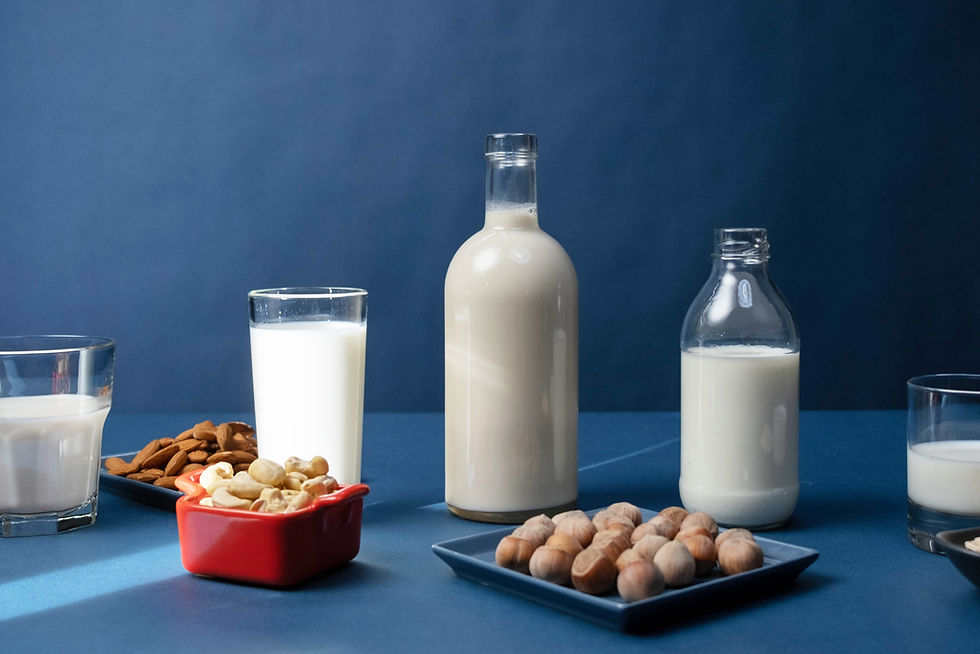Chronic Fatigue: Why am I so tired?
- Meg O'Rourke
- Feb 6
- 5 min read
Today, we're going to be talking about biofilms. But to begin with, we're going to be talking about mood and food once again, or food and mood, however you want to say it. We're going to talk about feeling drained, chronic fatigue, not being motivated. We are going to touch on all of that today.
If you struggle with chronic fatigue, coffee or energy drinks are not the solution. Let me repeat that—if you have chronic fatigue, coffee or energy drinks are not the answer. You know it, and so do I. How often do you see people grabbing a coffee or an energy drink to push through the afternoon slump? Maybe you've done it yourself—reaching for a quick fix at work, fighting off drowsiness at your desk. Some of you have even told me you’ve fallen asleep while driving. That’s serious. And yet, you think a temporary jolt from caffeine, or a quick supplement will fix the problem. It won’t.

The first step to real change is to schedule a free consultation with me. I’m available for your call, but it’s first come, first served—so check my calendar now.
Now, let me ask you something: Has your doctor, therapist, or psychiatrist ever asked if your depression or anxiety could be linked to a micronutrient deficiency or your gut microbiome? Probably not. And that’s where I do things differently. Traditional medicine and functional medicine both have their place—if you need surgery, you go to a surgeon. But if you’re struggling with chronic fatigue, depression, or anxiety, you need to dig deeper into the root cause.
The Microbiome and Mental Health
Feeling drained, wired but tired, or unmotivated? Your microbiome could be the culprit. We’ve all heard of seasonal affective disorder (SAD)—that sluggish, down feeling in the winter, craving comfort foods, not wanting to get out of bed. But did you know your gut health plays a major role in how you feel? Evidence is growing, and I’ve been talking about it for over 20 years.
Take vitamin D, for example—the “Kim Kardashian” of vitamins. It’s synthesized in your skin from cholesterol when exposed to sunlight. But vitamin D isn’t just about bones and calcium. It plays a crucial role in mood regulation and brain function. A recent meta-analysis even found that vitamin D supplementation can be as effective as antidepressants for depressive symptoms. However, this doesn’t mean you should stop taking prescribed medications—always consult with your doctor first.
We’re also learning that gut health directly affects emotional well-being. Depression has been linked to an imbalance in gut bacteria, known as dysbiosis, along with gut inflammation and leaky gut. So why aren’t more doctors running microbiome tests? It’s a question worth asking. Wouldn’t you want to understand what’s going on inside your body?
One of my recent clients told me after just 30 days of working together, “I’m not completely symptom-free, but I no longer feel exhausted every afternoon.” That’s progress. The gut microbiome was causing fatigue. By addressing harmful bacteria—not with antibiotics, but with targeted herbal supplements—we helped restore balance. Unlike antibiotics, which can wipe out good bacteria and lead to new issues like small intestinal bacterial overgrowth (SIBO), natural solutions work more effectively without harsh side effects.
Science Backs the Gut-Brain Connection
Research shows that certain gut bacteria can influence behavior and even reduce anxiety. Patients with depression often have an imbalanced microbiome, leading to chronic inflammation. So why isn’t microbiome testing standard practice? The good news is, you can take control. Testing is simple, and we can get started right away.
Your gut is more connected to your emotions than you may realize. Ever heard phrases like “gut feeling,” “my stomach was in knots,” or “trust your gut”? These expressions reflect a scientific reality: your microbiome affects your brain’s function. The gut-brain axis is a two-way communication system. If your gut is unhealthy, it can negatively impact your mood, energy, and mental clarity.
We know that sunlight increases microbiome diversity, promoting vitamin D production and reducing inflammation. Vitamin D plays a role in serotonin production—the neurotransmitter that makes you feel happy. In fact, an estimated 90% of serotonin is produced in the gut. When serotonin levels are low due to an imbalanced microbiome, it can lead to mood disorders, fatigue, and anxiety.
The Role of Supplements
Many people take supplements without understanding what their body actually needs. Marketing convinces them to buy products, but they never address the root cause. Are you spending hundreds of dollars a month on supplements that may not even be helping? Blindly taking supplements without proper testing is ineffective, and in some cases, even harmful.
That’s why we need to test—so we can determine exactly what your body requires. Functional medicine isn’t about generic recommendations like “cut out dairy” or “avoid gluten.” It’s about personalized data-driven decisions. Throwing supplements at a problem without knowing the root cause is outdated and, frankly, irresponsible.
Psychobiotics: A New Frontier in Mental Health
The term “psychobiotic” refers to probiotics that influence mental health by improving gut bacteria. The gut-brain connection is undeniable—fix the gut, fix the brain. While many people associate depression and fatigue with the brain, the gut plays a major role.
Harmful gut bacteria trigger inflammation that disrupts mood-regulating chemicals in the brain. This imbalance can cause chronic fatigue, sadness, brain fog, and anxiety. If you’re experiencing these symptoms, it’s time to investigate what’s happening in your gut.
The Gut-Brain Superhighway
The gut and brain are constantly communicating through the vagus nerve—a superhighway of information flowing both ways. When your gut is in balance, you feel good. You sleep well, have stable energy, and enjoy life. But when your gut is out of balance, it’s the opposite—fatigue, anxiety, depression, brain fog, and poor sleep.
You already know that food and exercise affect your mood. It’s time to stop ignoring it. Popping a pill isn’t a real solution.
I know firsthand how challenging health struggles can be. When I was 29, my husband passed away. Later, I suffered from serious GI issues after a hospital mishap. I nearly died and had to undergo emergency surgery. But I didn’t find healing through traditional medicine alone—I turned to functional medicine and made a full recovery. Fifteen years later, I feel incredible, and I want to help you feel the same way.
Be Your Own Healthcare Advocate
If you’re dealing with chronic fatigue, depression, or anxiety, your gut health may be at the root of it. Your microbiome plays a crucial role in serotonin production, mood regulation, and energy levels. The good news? You have control over your health. Testing your gut microbiome and micronutrient levels can provide the answers you need.
It’s time to stop guessing and start healing. Schedule your free call with me today.




.png)


























Comentarios